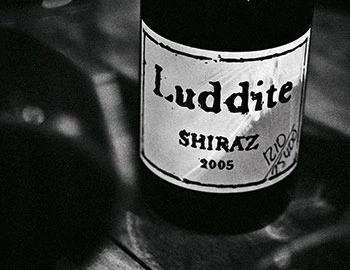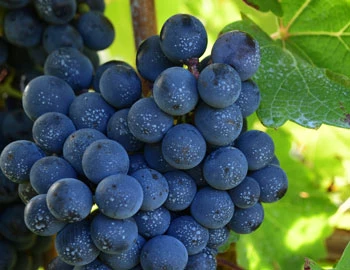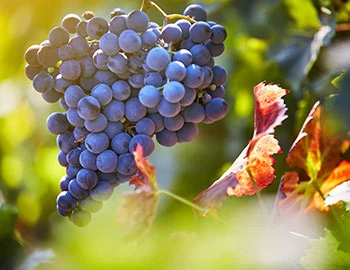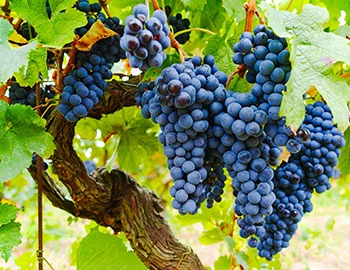
Saboteur Red 2018
WO Luddite, Luddite Wines, 750 ml

| Grape variety: | Shiraz, Cabernet Sauvignon, Mourvèdre |
| Producer: | Luddite Wines / Fam. Verburg & Meyer |
| Origin: | South Africa / Coastal Region / Bot River |
Description
The fragrance of ripe dark and red fruits, spices and garrigue herbs is underscored by floral, perfume-like accents and underpinned by fine roasting aromas. Juicy, with an intense, spicy and fruity taste, it spreads on the palate and has a fresh and balanced effect with pleasantly firm tannins.
Attributes
| Origin: | South Africa / Coastal Region / Bot River |
| Grape variety: | Shiraz, Cabernet Sauvignon, Mourvèdre |
| Ripening potential: | 4 to 10 years |
| Drinking temperature: | 16 to 18 °C |
| Food Pairing: | Spiced grillades, Wild specialities, Bistecca fiorentina, T-Bone steak |
| Vinification: | fermentation at low temperatures, fermentation in steel tank, Pumping over, cooling period |
| Harvest: | hand-picking |
| Maturation: | in partly new and used barriques/ Pièces |
| Bottling: | filtration |
| Maturation duration: | 12 months |
| Volume: | 14.5 % |
| Note: | Contains sulphites |
Luddite Wines / Fam. Verburg & Meyer
Niels Verburg is one of those people who you immediately want to befriend. With his imposing stature and beaming smile, he stands out and magically draws people in.
At an early age, while he was working in Australia, he realised that Shiraz was "his" grape. In Chile, he later found the inspiration for the way he wanted to make his wine.
Together with his wife Penny, he planted his first vines in 1996. The first vintage was pressed in 2000. The small winery with just 6 hectares of vines is located just outside the village of Bot River. Walker Bay is only 30 kilometres away. The mild Mediterranean climate from the nearby ocean gives the vines on the south-western slopes of the Houw Hoek mountains a slow and long growing period. This results in spicy Shiraz with elegant fruit sweetness.
The name of the vineyard refers to the Luddites, 19th century English textile workers who fought against the Industrial Revolution. Consequently, Niels is rather reluctant to use "technology", as he says in a humorous way, both when caring for the vineyards and working in the cellar. Vinification involves as little intervention as possible, if any.
Niels and Penny have fulfilled their dream. In addition to the vines, there are also some olive trees and a few lucky pigs are reared: a rural idyll in South Africa. They epitomize the great change occurring in South Africa since the 1990s: moving away from mass production and towards independent quality wines that do not fear comparison with top international wines.

Luddite Wines / Fam. Verburg & Meyer
Niels Verburg is one of those people who you immediately want to befriend. With his imposing stature and beaming smile, he stands out and magically draws people in.
At an early age, while he was working in Australia, he realised that Shiraz was "his" grape. In Chile, he later found the inspiration for the way he wanted to make his wine.
Together with his wife Penny, he planted his first vines in 1996. The first vintage was pressed in 2000. The small winery with just 6 hectares of vines is located just outside the village of Bot River. Walker Bay is only 30 kilometres away. The mild Mediterranean climate from the nearby ocean gives the vines on the south-western slopes of the Houw Hoek mountains a slow and long growing period. This results in spicy Shiraz with elegant fruit sweetness.
The name of the vineyard refers to the Luddites, 19th century English textile workers who fought against the Industrial Revolution. Consequently, Niels is rather reluctant to use "technology", as he says in a humorous way, both when caring for the vineyards and working in the cellar. Vinification involves as little intervention as possible, if any.
Niels and Penny have fulfilled their dream. In addition to the vines, there are also some olive trees and a few lucky pigs are reared: a rural idyll in South Africa. They epitomize the great change occurring in South Africa since the 1990s: moving away from mass production and towards independent quality wines that do not fear comparison with top international wines.

Luddite Wines / Fam. Verburg & Meyer
Niels Verburg is one of those people who you immediately want to befriend. With his imposing stature and beaming smile, he stands out and magically draws people in.
At an early age, while he was working in Australia, he realised that Shiraz was "his" grape. In Chile, he later found the inspiration for the way he wanted to make his wine.
Together with his wife Penny, he planted his first vines in 1996. The first vintage was pressed in 2000. The small winery with just 6 hectares of vines is located just outside the village of Bot River. Walker Bay is only 30 kilometres away. The mild Mediterranean climate from the nearby ocean gives the vines on the south-western slopes of the Houw Hoek mountains a slow and long growing period. This results in spicy Shiraz with elegant fruit sweetness.
The name of the vineyard refers to the Luddites, 19th century English textile workers who fought against the Industrial Revolution. Consequently, Niels is rather reluctant to use "technology", as he says in a humorous way, both when caring for the vineyards and working in the cellar. Vinification involves as little intervention as possible, if any.
Niels and Penny have fulfilled their dream. In addition to the vines, there are also some olive trees and a few lucky pigs are reared: a rural idyll in South Africa. They epitomize the great change occurring in South Africa since the 1990s: moving away from mass production and towards independent quality wines that do not fear comparison with top international wines.

Cabernet Sauvignon
The backbone of Bordeaux
The Cabernet Sauvignon gives the Bordeaux its backbone, yielding deep violet wines with powerful tannins and endless ripening potential. It is the top dog in Médoc, and is placed in all five premier crus of Bordelais. When young, it often appears strict and unapproachable, but with advancing years, its tannins round off. It is wonderfully velvety, and yet always maintains its freshness. Typical flavours include cassis, graphite and cedar. Wherever Cabernet Sauvignon is found, Merlot is not far away. It complements the robust structure of Cabernet with softness, fruit and richness. The Cabernet Sauvignon is the most-exported vine in the world. It delivers persuasive qualities in Italy as an ingredient of the Super Tuscan, or as the flagship variety from California. There, it is lovingly titled “Cab Sauv”. Meat fans should be aware that it fantastically accompanies a grilled entrecôte. The family tree of Cabernet Sauvignon is surprising: its parents are Cabernet Franc and the white Sauvignon blanc.

Shiraz
A hint of pepper
The legend stubbornly persists that the Syrah variety came from the Persian city of Shiraz. Yet, researchers have shown that it is a natural crossing of two old French varieties: the red Dureza from the Rhône Valley and the white Mondeuse blanche from Savoy. Wines from Syrah are gentle and concentrated. They smell of dark berries, violets and liquorice, and amaze with a piquant touch of white pepper. As varietal wines, they are found on the northern Rhone, as in the Hermitage or Côte Rôtie appellations, as well as in Swiss Valais. In the southern Rhône Valley, Syrah is often wedded with Grenache and Mourvèdre. In 1832, a Frenchman brought the variety to Australia, where it became the emblem of the national wine industry. There, the weightiest versions develop with typical notes of tar and chocolate.

Mourvèdre
Hot-blooded Spaniard
It cannot be hot enough for the Monastrell grape. It grows around the Mediterranean, where the summers are long and hot and the winters mild. At only 200 metres in elevation, or 80 kilometres from the coast, its grapes have problems ripening. It was likely born in the Valencia region. According to written records, it was already counted among the most important varieties in 1460. Its exact origin is thought to be the Camp de Morvedre area. From there, it migrated in the 17th century to Provence, where it was christened Mourvèdre. Its wines are deeply dark, with intense blackberry aromas, rich tannins and moderate acidity. They enter into the most beautiful harmonies with other varieties from the south, such as Garnacha, Carignan or Syrah. The Mourvèdre is the main ingredient of red wines of Bandol; it also flows into the Châteauneuf-du-Pape. On the Spanish Levante coast, it is also pressed solo.


